Modern cinema sometimes feels like a revolving door, with films – even big-budget ones – coming and going in the blink of an eye, many of them barely registering themselves in the popular consciousness.
Some may even do tremendous business in monetary terms for a weekend or week, but within a month or two will have passed largely undigested through our systems as we look to the next big release.
Kind of the same way you don’t linger on last night’s quarter-pounder, even if you enjoyed eating it. For a movie in this climate to have a lasting impact or resonance is difficult; but the same was true 10 or 20 years ago. Reference books are littered with the names of broadly distributed cinema releases that had no real legacy beyond their fifteen minutes of hype.
Last year, however, marked the twentieth anniversaries of four films in particular that exempted themselves from this trend; four hugely popular, hugely memorable films that have each resonated across the years in their own right, acquiring new audiences beyond their time of release. Pulp Fiction, The Shawshank Redemption, Schindler’s List and Forrest Gump are four movies that couldn’t be much more different from one another.
But each of them are bona-fide classics and have become cultural giants in modern cinema.
The Shawshank Redemption, like Frank Capra’s It’s a Wonderful Life, was a film that famously flopped commercially when it was released, yet relatively quickly became regarded as a classic. Adapted from the Stephen King novella Rita Hayworth and the Shawshank Redemption, the film was written and directed by Frank Darabont. I don’t have to re-watch that film often to remember its details vividly; scenes, images and moments embed themselves into the mind-scape, from The Marriage of Figaro recording playing out to the entranced inmates to the triumphant escape through a tunnel of “foul smelling shit” and that victory thrust in the rain.
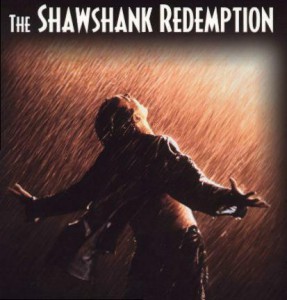
And I swear I had residual Morgan Freeman narration going on in my head for about a week after I first saw the film, such is the extent to which his voice embeds itself into sense-memory. Clint Eastwood, Harrison Ford, Paul Newman, and Robert Redford were all considered for Morgan Freeman’s iconic role as Ellis Boyd “Red” Redding; any of whom would now be impossible to imagine in the role that Freeman made so abidingly memorable. There is so much of Morgan Freeman’s idiosyncrasy in the performance that the mere thought of an alternative casting choice makes one grimace.
The soundtrack is a major feature too, as is so often the case with the films that seem to resonate the most; Thomas Newman’s music is as important to the underlying heartbeat of the picture as Morgan Freeman’s narration is. Much of Newman’s score consists of faint piano music and pizzicato strings during the more active or humorous moments, with the two ‘main’ themes featuring only two or three times in the film; but the nuances of Newman’s soundtrack are stunning, with refrain and subtlety in the right places and with more epic-sounding crescendo where it’s the most effective (the triumphal climax of the score during Andy Dufraine’s prison escape, for example, which imparts so much to that scene).
Newman’s music is a very key part of what makes this movie resonate so strongly.
The cult status of The Shawshank Redemption, regarded as an all-time classic, somewhat flies in the face of contemporary big-budget cinema’s obsession with ‘opening weekend’ profits where speed-profit is the name of the game and where movies that don’t do serious business immediately are often regarded as ‘flops’ or failures.
That never used to be the case even in Hollywood, where even high-profile movies were measured by how much business they did over a longer period of time (and when films stayed in cinemas for longer too, it has to be said: something like Doctor Zhivago stayed in cinemas for the better part of a year).
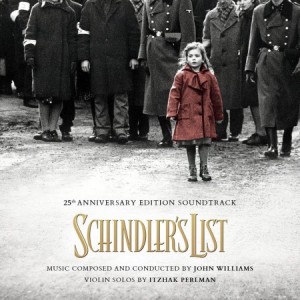
Both Pulp Fiction and Schindler’s List on the other hand were films with pretty much universal approval, both critical and commercial.
The former might be regarded as having been a foregone conclusion for both commercial success and critical regard, given the subject matter and having Steven Spielberg as director. Which is not to make light of it, by any means; Schindler’s List more than lived up to its expectations. There was no way someone like Spielberg would’ve put out anything that he hadn’t measured perfectly right down to the last frame, given the highly sensitive subject matter and his own sense of personal connection.
A key part of what works so powerfully in Spielberg’s film are the silences and the low-key way some of the most upsetting moments are presented; moments that might’ve been more expanded or amplified in another filmmaker’s hands with over-dramatic camera tricks or swells of emotion-prodding music, but in Spielberg’s movie are presented as unembellished, matter-of-course events.
This deliberately casual pacing and presentation in certain scenes is intended to convey the casualness of Nazi officers’ brutality and disregard for Jewish life; and it does so effectively, far more so than any over-the-top villainy or Hollywood-style emotion-inducing filters would’ve accomplished. One of the moments I remember most, for example, is a brief scene where a female Jewish worker is shot in the head by Nazi officers; what’s so unsettling about that scene is how casually it is presented and how quickly the camera moves away from her and the film moves on.
The quietness of the film is one of its major strengths and one of the things that lingers in the senses when we think about it, and it was especially conspicuous because we know Spielberg is just as adept (even inclined) at doing the opposite in his films too.
Of course the two central performances are an enormous part of what elevates a film of this type too; Liam Neeson’s Oskar Schindler is the solid rock around which the rest of the performances can rotate. Neeson obviously has that steadfast cinematic presence and acting gravitas that a film of this type desperately needs at its center; but it’s Ralph Fiennes’s Amon Goeth that is the most memorable performance. Fienes’s Goeth is utterly compulsive viewing, presenting us with a true-believing, zealous adherent to the Nazi ideology and the inner workings of his mind; this is no unfortunate bureaucrat swept up in the tide of nationalism and simply “following orders”, but a conscious, willing party to state-level inhumanity.
The worst of it is the sense of enjoyment in the crimes that Fiennes’s performance puts across.
It’s a depiction of what we can legitimately call “evil”, but not entirely without psychological complexity. It’s villainy with disarming nuances and subtleties, the complete and utter opposite to, say, the Mel Gibson approach to something like The Passion of the Christ where all the villainy is exaggerated and amplified and therefore loses any power.
Fiennes’ casting reportedly came after Spielberg saw him in A Dangerous Man: Lawrence After Arabia (a superb made-for-TV film, by the way). Fiennes, arguably the finest English screen-actor of modern times, watched historic newsreels and talked to Holocaust survivors who knew Goeth. In portraying him, Fiennes has said “I got close to his pain. Inside him is a fractured, miserable human being. I feel split about him, sorry for him. He’s like some dirty, battered doll I was given and that I came to feel peculiarly attached to.”
Spielberg said of Fiennes’ audition that “I saw sexual evil. It is all about subtlety: there were moments of kindness that would move across his eyes and then instantly run cold.”
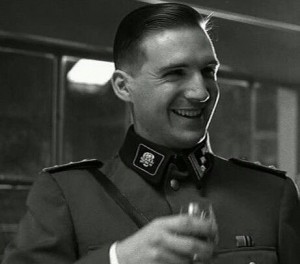
Legend has it that Fiennes looked so much like Goeth in costume that when Mila Pfefferberg (a survivor of the events) met him, she trembled with fear; which is reminiscent of the stories of the late, great Anthony Quinn (allegedly) being mistaken for the real-life tribal leader Auda Abu Tayi by Beduin extras during filming for Lawrence of Arabia.
Ralph Fiennes’ Amon Goeth remains possibly the most memorable, compelling depiction of a real-world “bad guy” in any film you might ever see. As for the movie as a whole, regardless of any personal or perceived biases, political leanings, revisionist history or anything else, no one could legitimately deny its power.
It is a masterpiece, really. Janusz Kaminski’s cinematography is evocative throughout and frankly masterful.
There’s a lot of interesting trivia around Schindler’s List, as there tends to be for most classic films. Stories for example about how Robin Williams would call Spielberg to cheer him up, given the otherwise grim atmosphere on the set. Remarkably, Spielberg said that even as he was knee-deep in Schindler’s List he was also spending several hours each evening editing Jurassic Park, which was scheduled to premiere in June 1993. That must’ve been a major mind-fuck, trying to edit a blockbuster pop-corn movie about dinosaurs while also trying to make a very sober film about the Holocaust.
The modest budget meant the film was shot quickly over seventy-two days, with forty percent of the film shot with handheld cameras. Spielberg felt that this gave the film “a spontaneity, an edge, and it also serves the subject.” He filmed without using Steadicams, elevated shots or zoom lenses – in short, “everything that for me might be considered a safety net,” he says of the process.
Based on the novel Schindler’s Ark by Thomas Keneally, an Australian novelist, Spielberg reportedly cited the fact Neo-Nazism was on the rise again and that Holocaust deniers were being given serious consideration by the media at that time as one of the principal reasons he took on such a daunting, important project.
Spielberg had reportedly tried to pass the project on to Roman Polanski (who had lived in the Krakow Ghetto and whose mother had been killed at Auschwitz), but Polanski turned it down due to the sheer emotional weight and trauma it would have represented. What Polanksi’s version of Schindler’s List might’ve turned out like, we can only speculate.
But Spielberg’s project is one of the most compelling, unsettling and memorable films ever made.

Tarantino’s Pulp Fiction couldn’t be any further from Schindler’s List if it tried. But it’s hard to think of a film in the last thirty years that has attained such a universal status as a cult classic and a benchmark in American cinema.
Regarded as the cardinal template for post-modern film, with its unconventional, non-linear structure and overt use of pastiche and homage, to call it influential would be the understatement of the century. To call it superb is almost doing it a disservice. And to try to explain in writing what’s so good about it is actually quite difficult, though I’m certain there are cinema experts and film buffs elsewhere on the web who have done so at length.
Iconic is a word over-used by writers (myself included), but if there was ever something it unquestionably applied to, it’s Pulp Fiction; it is also the epitome of a word I hardly ever use in writing: “cool”. I mean any other claim to “cool” should be measured in relation to Pulp Fiction.
From the opening Tim Roth dialogue in the diner to Uma Thurman’s unforgettable, Lauren Bacall esque Mia Wallace, and with every bit of immortal Samuel L. Jackson dialogue in-between, it was a script, screenplay and end product that didn’t just raise the standard of contemporary cinema, but set a whole new standard.
Variety also credited Pulp Fiction with having “forever altered the game” of independent cinema, particularly in regard to the film’s path from its Cannes launch to a commercial phenomenon and the incredible financial return on its relatively small budget, going on to also call it “the Star Wars of independents, exploding expectations for what an indie film could do at the box office.”
The movie wasn’t loved by everyone, however, particularly those of more conservative tastes. On May 31st 1995, the Republican presidential candidate Bob Dole condemned the American entertainment industry for peddling what he called “nightmares of depravity”. Contrary to some opinion, Dole had not in fact mentioned Pulp Fiction specifically, though he did cite Natural Born Killers and True Romance, two modern cinema classics Tarantino had involvement in. A year later, however, he did accuse the movie of specifically glamorising heroin use.
Elsewhere, in The Guardian, James Wood remarked: “Tarantino represents the final triumph of postmodernism, which is to empty the artwork of all content, thus avoiding its capacity to do anything except helplessly represent our agonies. Only in this age could a writer as talented as Tarantino produce artworks so vacuous, so entirely stripped of any politics, metaphysics, or moral interest.”
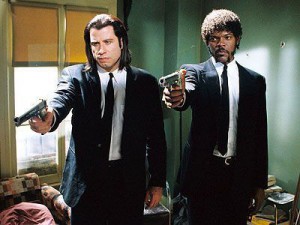
But I’m not sure there’s a modern (ish) movie that could claim to feature so many genuinely iconic moments or elements.
From the image of Jackson’s and Travolta’s characters stood side by side in suit and tie, the “royal with cheese” dialogue, the Vincent Vega/Mia Wallace dance routine (probably the most referenced or parodied cinematic reference since the Star Wars Trilogy), to the Ezekiel speech or the fact that getting “medieval on your ass” has become part of the common language.
Every time I watch Pulp Fiction I am astonished all over again at just how remarkable a film it is in every sense; style, structure, content, even the knowing, perfect soundtrack choices. If there is anything that could be called a weak-spot in the movie, for me it would be the Bruce Willis material; when the film drifts off from Jules, Vincent or Mia for an extended period, that’s when I tend to get restless until it comes back to them again. But that only became the case once I was watching the movie for the third or fourth time.
With its irresistible, flowing dialogue, odd juxtaposition of casual violence and humour, and knowing cinematic allusions and rambling pop-culture references, Pulp Fiction is an utterly addictive substance, just as much so twenty years later as it was on first viewing.
When it ends, as coolly and rhythmically as it started, you’d happily have another two hours of it or even just one more page of Jules Winnfield dialogue. And all of that said, it isn’t even my favourite Tarantino movie; Kill Bill 1 would claim that distinction, a movie that somehow allowed Uma Thurman to embody an even cooler character than Mia Wallace. Pulp Fiction did also, for that matter, do us the service of making a fully-fledged film star out of Uma Thurman and ensuring Samuel L. Jackson’s career.
All in all, as far as game-changers go, Pulp Fiction can easily be said to be up there with the likes of Citizen Kane, Apocalypse Now, The Wizard of Oz, Psycho and Star Wars.
Based on the 1986 novel of the same name by Winston Groom, the Robert Zemeckis-directed Forrest Gump undoubtedly would be seen by most as the least “cool” of the four film featured in this article.
It is also a movie that, despite its immense popularity, is still seen as divisive. It’s easy to understand why Forrest Gump might be viewed a certain way. It is understandably seen as too sentimental and too much a celebration of the “American Century”.
In 1994 a CNN debate argued whether the movie was a promotion of conservative values or a cynical indictment of the sixties’ counterculture movement. As late as 2004 the argument was still going on, with Entertainment Weekly referring to the film as “one of cinema’s most clearly drawn lines in the sand.” Writer Thomas Byers branded Forrest Gump an “aggressively conservative film” in a piece for Modern Fiction Studies.
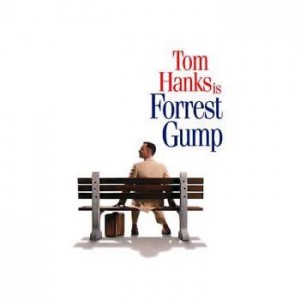
It is easy to see where that perception comes from; the path of Tom Hanks’s character through the story is one of a highly conservative, ‘innocent’ lifestyle and mindset and throughout the film is measured against Jenny Curran’s (played by actress Robin Wright) comparatively subversive lifestyle and life choices.
Where Gump serves in the army, goes to Vietnam, meets Presidents, etc, Curran embraces the sixties counter-culture and is depicted attending anti-war and anti-establishment rallies, being a drug user and also having a promiscuous lifestyle. While one could argue that the film doesn’t make moral judgements, it could also be argued that there’s a strong implication of Gump’s life being portrayed as the more legitimate path and Curran’s being something of a morality tale or scare story about the price of taking the counter-culture path.
The fact that her character dies from AIDS is understandably seen by some as a not-very-subtle, perhaps even slightly glib, way of hammering home that point: the point being that straying from ‘mainstream’ values leads to failure and suffering (and death), while ‘innocently’ going along with the status quo in the least cerebral life possible (and the defining characteristic of Forrest Gump as a character is his innocence and lack of intellect) allows you not only to survive, but to be a hero.
It’s difficult for me to watch this movie now and not see all of these undercurrents; though that doesn’t make it a bad film, even if it has questionable messages. There’s also a view that the movie idealises the 1950’s in America, glossing over some of the most important social issues and conflicts; an example being the absence of ‘whites only’ signs and the like in Gump’s southern upbringing.
I personally find it interesting as well that the film was released in 1994, amid the cultural phenomenon of the so-called ‘slacker generation’ – a media label coined to describe a culture of apathy, disenfranchisement and fatalism perceived to characterise a certain generation of people at the time, particularly those who’d grown up in the Reagan/Thatcher era. Encompassing certain non-mainstream strands of everything from film, literature and music to journalism, the so-called ‘slacker culture’, which to begin with may have been strongly associated with the ‘grunge’ scene and the cultural penetration of alternative music pioneers, was possibly that generation’s ‘counter-culture’ movement.
Unlike the sixties counter-culture, it wasn’t idealistic or aimed at changing the world, but to many was the opposite; dissatisfied and fatalistic.
Which would make sense, as the sixties counter-culture idealism was seen as having failed miserably to accomplish anything, having been destroyed or absorbed by the prevailing establishment.
I was personally a little too young still at that time to be regarded as being of that generation, but I was heavily influenced by and steeped in that ‘culture’ (primarily through the music that got stigmatised by that label) and still have to regard it now as a formative influence on my own thinking and personality. I remember very clearly seeing footage of US conservative commentators shortly after Kurt Cobain’s suicide glibly and aggressively criticising the disenfranchised young for caring so much about Cobain or other ‘poor role models’ and mocking the perceived hang-ups and problems of that generation, regarding them as self-indulgent, self-pitying whingers and at the same time extolling the virtues of previous, conservative generations and values.
Given some of that backdrop, I’ve wondered if the tone of Forrest Gump was partly tailored to speak to that audience at that time, reaffirming traditional values and a conservative sense of America and American culture.
That may be an overly cynical view and may also be completely wrong; but it’s just a perception.
All of that said, I’m not sure I see the movie as quite the aggressive attack on sixties liberalism or counter-culture as others do. That undercurrent is there in the film of course, but its questionable as to how much it is actually deliberately written into the screenplay. The film could also be seen as being just as critical of elements of the history it covers as it is celebratory; it isn’t as idealistic or ‘feel-good’ a film as it’s perceived to be by many. It certainly isn’t a rose-tinted vindication of all things America either and can be seen to be pretty scathing about the Vietnam War, for example, or the country’s treatment of Vietnam veterans. In places it’s pretty grim, in fact.
You also can’t quibble with Tom Hanks’s performance (John Travolta was originally though of for the role, if you can believe that), even if you might quibble with elements of the movie. While Philadelphia was the role that definitively turned Hanks from quirky eighties comedy actor to major film actor, it’s Forrest Gump that Hanks will be first and foremost remembered for in decades to come.
The film can be said to be corny, overly sentimental in places, yes; but also genuinely moving or endearing in others, much the same as you might say in the case of Frank Capra’s It’s a Wonderful Life.
Cultural or social analyses aside, the other fact is that as a film Forrest Gump is undeniably a very good one; every time I see it I’m drawn into watching through to the end again. And in the final analysis of a film, that basic criteria of it being an enjoying or engaging work is difficult to override unless the film is so overtly offensive as to be rendered unpalatable; which I would argue isn’t the case with Forrest Gump.
Like the Roman Polanski/Schindler’s List question, the fact that Terry Gilliam was apparently an original choice for director becomes a fascinating ‘what if’ scenario though; one wonders what sort of Forrest Gump we would’ve had if Gilliam had taken the job on. Bill Murray, it is said, was also considered for the lead role; I would love to see a version of the movie with Murray’s more sarcastic, deadpan take on the character; it would be a very different tone and a very different movie, though not necessarily a better one.
At any rate, what no one could argue is that each of these films has a permanent place in the cinematic annals, each has long-term legions of fans and each can inspire interpretations, essays and analyses for a long time to come.
All four of these movies have a timeless quality that lends itself to longevity; the sense is that even thirty years from now all four will probably still be talked or written about and still be in heavy rotation.
One wonders what equivalent movies released in 2014 or 2015 will have that kind of legacy twenty years from now.
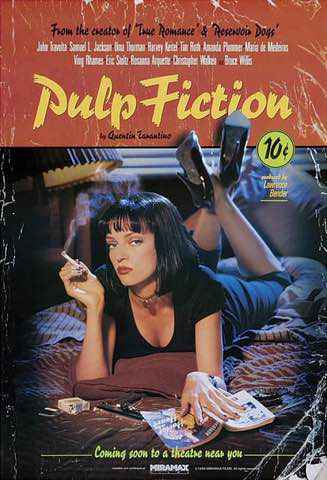
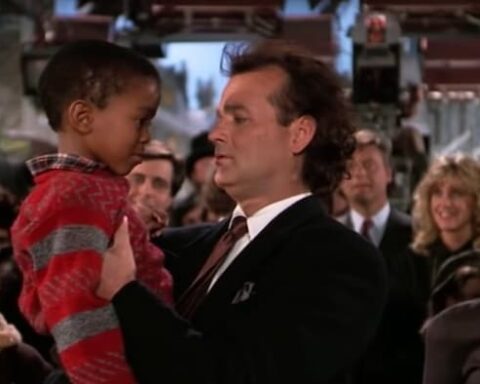
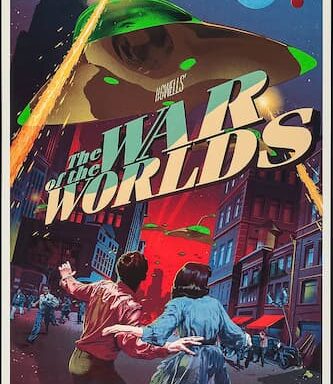
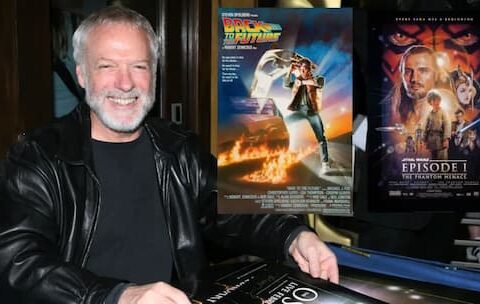
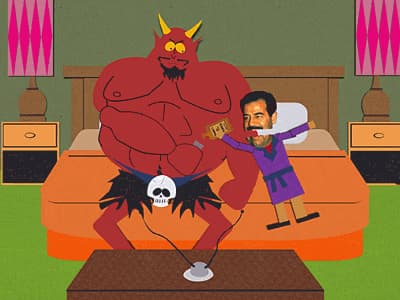
Thanks,it really helped 😉
Impressive post! Best wishes & happy weekend ! Aquileana 😀
Thanks Aquileana 🙂 BTW, people should check out Aquileana’s blog, it’s really good, especially if you’re a history or culture lover.
Oh, fantastic treatise here! What an interesting topic, to reflect on four impactful movies from 20 years ago… (20 years? man that makes me feel old….)
Shawshank is pretty great. I had no idea it was based on a short story by Stephen King though. (how many of his writings have been made into movies anyhow? Dozens at least)
Anyhow, funny to read about Schindler’s List, because I was actually thinking about that film not too long ago, more or less reflecting back on it through the lens of basically now wondering how much of it possibly serves as very much a piece of propagandist material in relation to the broader Zionist agenda, etc. (btw, I really liked your statements in the podcast talking about the Holocaust and how we should all be able to question/examine everything. I personally as well do not doubt the historicity of the Holocaust actually occurring, but I do believe it is pretty hard to refute the fact that it played a major role in Israel achieving U.N. statehood, and convincing Jews to emigrate, etc.) I actually almost wrote a blog post once, talking about that little girl in the red dress, but I never felt like I had fleshed it out in my mind thoroughly enough to write something I would be proud of. Basically I think back on that film (which of course was masterfully done…) and can’t help but think that it kind of works as a metaphor for the broader Jewish/Israel narrative as a whole. The girl in the red dress. Child. Innocent. Victim. Gas chamber. Etc. It is most definitely an “icon” in the literal sense of the word. I don’t know if I’m making sense here, but anyways….
It is indeed hard though to find words to describe how great/cool/iconic Pulp Fiction is, without instantly falling into clichés. It’s the kind of movie that even now, if I’m flipping through channels and stumble across it, at any given point in the film, I am most likely to stop and find myself mumbling along to the genius dialogue, or marveling at how that tiny bit role as a drug dealer in a bathrobe was still somehow the greatest thing Eric Stolz ever did. (“Are you guys going to a volleyball game or something…?”) 🙂
Gump is a hard one for me. It definitely rubs me the wrong way, for reasons I’m not sure I’ve fully vetted from my own sub-conscious. To me I don’t know that it’s necessarily this thing meant to be pro/con towards conservative/liberal ideologies, I mean, maybe on a surface level or whatever, but deeper than that it really just works as a sort of “nostalgia piece” which serves to connect with both “sides” in a similar kind of way. Particularly with people I believe who actually lived through all those milestone events of the 50’s/60’s and could remember where they were when say, JFK got shot or watching the first man “walk on the moon”, etc. It’s definitely aimed primarily at the Baby Boomers first, appealing to that underlying sense of identity as an “American”, regardless of what political/cultural persuasion you have, by means of taking all these 20th century pop-culture tidbits and stringing them together with an over-the-top character device.
I guess that’s probably the main thing that bugs me, the fact that the character of Gump himself feels very much like a sad-but-all-too-perfect metaphor for the average Joe, who blithely bumbles his way through the decades, virtually oblivious to the true nature of what is actually going on around him. I think I tend to avoid that movie nowadays, to be honest, because if I were to watch it now I know I’d having a very hard time not slipping into an incredibly cynical state of feeling like I’m surrounded by a veritable sea of “gullible Gumps”…. 🙂
(oh, I am so sorry for such a long comment! I confess I love films too, and your retrospectives here were just very thought-provoking, so it’s really your fault.)
Whoa dude, that’s one of the longest comments I think I’ve ever had 🙂 Which is great, because it shows that you’ve actually read the piece 🙂 I get your point about Schindler’s List, but I wanted in this instance to just talk about it filmmaking terms and not touch on any broader political or social issues. It’s still a superbly made film, however you look at it. I know Spielberg is an unpopular figure for many, but I still rate the guy highly as a filmmaker. With Forrest Gump, I have a degree of cynicism towards it too, but I still think it’s another very well made film and highly watchable/entertaining in spite of all the undercurrents. Hey, out of curiosity, what’s your favorite of the four? I’m guessing from your comment it would be Pulp Fiction…? Thanks for taking the time to comment meaningfully, by the way.